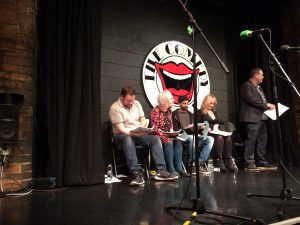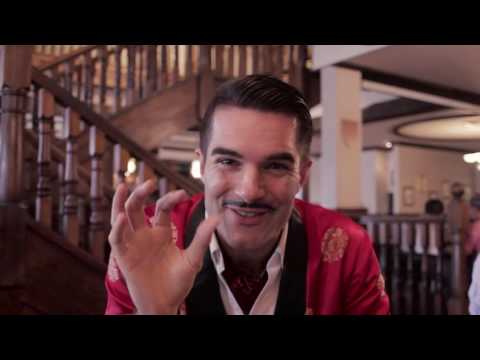10 ways to learn the art of comedy writing
By Daniel Page
I’ve previously talked about the importance of learning and mastering the basics of comedy writing and how it can help you move up the ‘ladder’ of opportunity and get noticed by producers. Below are ten ways you can go about this… I recommend you try as many as possible!
- Go on a comedy course. You wouldn’t try baking a cake without a recipe, so why try to write comedy without understanding how it works? They’d both just be a big floury mess. There are lots of courses to choose from, both academic institutions and industry writers/performers. Have a good look at the course description and tutor bio to find something that matches your comfort level and budget. The chance to ask questions of an experienced tutor and bounce ideas off fellow writers can make a real difference to your learning. Whilst some courses focus on sitcom (e.g. http://bit.ly/1Uc9JCg), others look at sketch (http://bit.ly/1VZbj9N) or more general techniques (http://bit.ly/1U8pKDM). Check out our courses page if you want to learn the basics of writing comedy.
- Listen to Newsjack. BBC Radio 4 Extra’s Newsjack (http://bbc.in/O7dyIz) is a great example of how new writers should write topical sketches and one-liners. Listen carefully to an episode (sticking a pencil behind your ear might help) and try to unpick the structure and rhythm of the material. They all follow a very similar formula and they ALL generate laughs (and the occasional groan) from audience. It’s a simple but effective style recognised across the comedy writing industry. Plus the producers are really great guys. Like super great. Top top people. Like THE best (no really). Any jobs guys…? No?
- Read a book. There are many books on writing comedy, so why not invest a few pounds in what amounts to a masterclass from a professional. To get ahead of the pack, I recommend investing the time putting into practice the words on the page (and you thought you’d escaped homework…). I found The Serious Guide to Joke Writing by Sally Holloway (http://amzn.to/1PtGXFJ) to be a fantastic foundation into the basics which you can dip into time and again. For a more detailed inspection of humour the The Cheeky Monkey by Tim Ferguson (http://amzn.to/1XphPb8) is pretty much the mother-lode, but be prepared to sink hours into that bad boy and James Carey’s thorough, charming and honest Writing that Sitcom (http://amzn.to/1Uju8Co) gets my vote for all aspiring sitcom writers (plus it’s a Kindle book, which makes you look cooler when you read it…right?)
- Read writer’s blogs. James Cary keeps a really good blog (http://bit.ly/28Scl7W) about the art of sitcom writing, PLUS does a free podcast. He’s basically a very nice man sharing some very useful information. I’d also recommend David Salisbury’s archive (http://bit.ly/28QKAYa), Ian Tiller’s site (http://bit.ly/290DnWa) and of course my site (http://bit.ly/28VHvtd).
- Read some scripts. Studying scripts that Producers have bought can provide a great insight into what ‘good’ looks like. Try breaking down and understanding how the script was put together and what makes it strong. Is is the characters? The pithiness of the dialogue? The surprising jokes? Or that hilarious custard pie fight on page 7? (Idea for sitcom – two sexually repressed clowns head to Vegas where HILARIOUS antics ensue). The BBC Writersroom (http://bbc.in/28JFcb1) is a great place to find sample UK scripts and this site (http://bit.ly/28JL8zA) is amazing for US shows. Newsjack host a nice sketch from Sarah Campbell (http://bbc.in/17golt9) and Tom Neenan has written a brilliant introspective (http://bbc.in/28Jco0A) that is a must read. Both Sarah and Tom are ex-BBC Bursary Writers, the ‘gold standard’ of comedy writing placements to aspire to! I’d also recommend any time you meet a writer to ask if you can swap scripts – that way you’ll see what the ‘competition’ is up to, get a feel for different writing styles and maybe spot some techniques you can add to your repertoire. Don’t forget, this deal only works if you have something for them to read as well.
- Watch some sketches online. Try looking at sketches from the perspective of a writer. Once you feel you’ve understand the basics, looking for the theory action can be a brilliant way of mastering your craft (and is a great excuse to sit on YouTube for a couple of hours). Look for common structure, rhythms and mechanics. Do they follow what you’ve learnt or break the rules in a knowing way? If you think they’re rubbish can you work out why they didn’t work? Mitchell and Webb sketches (e.g. http://bit.ly/1dMYla0, http://bit.ly/1T6enLT & http://bit.ly/2fzUlhj) can be a great place to start.
- Collaborate. Writer can be a lonely art…but it doesn’t have to be. Bouncing ideas and gags off other writers and performers can help you quickly learn what works and what doesn’t and fellow writers will be facing the same challenges as you. Some may even have found solutions. Places like the Comedy Crowd Writers and Actors group, or the British Comedy Guide’s collaboration forum are a great way to find someone to work with. Why not try teaming up with that writer you just met the other day who you got on really well with? When you find someone good, learn from them. When you just don’t click with someone, don’t be afraid to move on.
- Go see live comedy. It doesn’t matter if it’s stand-up or live sketch, there’s little substitute for seeing first hand what makes an audience laugh. Again put on your writer’s hat (unless it blocks the view of the people behind you) and get a feel for why something is or isn’t working. In particular, spot the moments that build the ‘energy’ in the room and help the audience find their way into a routine. NewsRevue for me was a revelation – bad writing had nowhere to hide but good writing…that got the room in stitches and a round of applause. If it’s your words that do this then the feeling is incredible.
- Practice. You wouldn’t enter a tennis tournament without having a few practice matches first, would you? Actually you might, but chances are you’d crash and burn. Write some jokes. Write some more. Create some sketches. Bin them and try again. They say it’s 10,000 hours to master something and whilst you might not agree with the exact number, hopefully you will agree that someone who’s been writing for a year probably has the edge on someone who’s been writing for a week. That’s unless you don’t bother doing 10.
- Ask for feedback. I can’t understate the importance of this one. If you’ve written 1,000 jokes but not shown them to anyone then I’m afraid you’ve not understood what it is to be a comedy writer. Feedback allows you to test some material before it’s put in front of an audience. It’s VERY painful when no-one laughs at your material, so why not test it first by sharing your work in a safer environment? Free options include friends and family, creative contacts you get on well with or, if you’re feeling a little braver, you can try the critique forum at the British Comedy Guide. In terms of paid options the Comedy Crowd Writersrooms give you feedback from a select group of fellow writers and an experienced script editor. It’s vital that you embrace negative feedback as this is nature’s way of telling you where something isn’t working and allows you to try and fix it. It’s worth double any positive feedback you may receive, so be brave and share. It will make you a better writer.
You’ll note that none of the above include ‘send stuff off to a producer’ or send ideas into a competition. That’s because I’d only recommend doing so after you’ve built your technique, rather than as a way of building your technique. For more ways on doing this, check out my blog either directly or via the Comedy Crowd.
Daniel is a freelance script-editor, writer and producer of comedy shorts, sketch, sitcom and one-liners with credits on NewsRevue, Newsjack and The Sitcom Trials. For bespoke advice on your script visit www.coiledslinky.strikingly.com. Comedy Crowd members get a 10% discount on some services.

 Daniel Page is a freelance script-editor, writer and producer with credits on Newsjack, NewsRevue, 12 sketches in a London Shed and The Sitcom Trials. In this article, the first in a series aimed at helping aspiring comedy writers, Daniel talks about the many opportunities that exist for those willing to embrace the realities of writing comedy.
Daniel Page is a freelance script-editor, writer and producer with credits on Newsjack, NewsRevue, 12 sketches in a London Shed and The Sitcom Trials. In this article, the first in a series aimed at helping aspiring comedy writers, Daniel talks about the many opportunities that exist for those willing to embrace the realities of writing comedy.
 Alas, my sketch didn’t make the final recording, but I’m glad I managed to get to the first recording session in Manchester and see my sketch being recorded (as well as seeing Jason Mansford live). Had I not gone, I wouldn’t have known that my elderly, male executive character had been recast as a young woman and the young, female producer had been recast as an older woman. The sketch started well, got some good laughs but then, probably not helped by a fluff which resulted in the sketch being restarted, the end of the sketch failed to get any laughs. However, to quote from the very nice letter from the BBC informing me it hadn’t made the final edit, “You wrote one of the 80 best sketches we read out of about 2,500”.
Alas, my sketch didn’t make the final recording, but I’m glad I managed to get to the first recording session in Manchester and see my sketch being recorded (as well as seeing Jason Mansford live). Had I not gone, I wouldn’t have known that my elderly, male executive character had been recast as a young woman and the young, female producer had been recast as an older woman. The sketch started well, got some good laughs but then, probably not helped by a fluff which resulted in the sketch being restarted, the end of the sketch failed to get any laughs. However, to quote from the very nice letter from the BBC informing me it hadn’t made the final edit, “You wrote one of the 80 best sketches we read out of about 2,500”. The £23 I spent went on two campaigns. The first was run for four days, six weeks before the event was due to take place. I chose to send the adverts out to Facebook users over sixteen within a 17km radius of Leamington (the smallest radius I could select), spoke English and who had an expressed interest in BBC Radio 4 Extra, Radio comedy, Podcasts, Theatre, Milton Jones, Podcasts, BBC Radio 4 or Sketch comedy.
The £23 I spent went on two campaigns. The first was run for four days, six weeks before the event was due to take place. I chose to send the adverts out to Facebook users over sixteen within a 17km radius of Leamington (the smallest radius I could select), spoke English and who had an expressed interest in BBC Radio 4 Extra, Radio comedy, Podcasts, Theatre, Milton Jones, Podcasts, BBC Radio 4 or Sketch comedy. I posted over 300 flyers through doors near the church and only two people indicated they’d seen one. However, sixty per cent of the people who reserved seats said they’d found out about the event through flyers on public display. I put out flyers around Leamington over the six weekends before the event, pinned on noticeboards in local sports centres, supermarkets, bookshops, the library, the Town Hall and anywhere else I could get permission to, but mostly in cafes. Often, I would have to re-arrange the notice board to fit mine in, but I always made sure I never obscured someone else’s flyer. It’s annoying to go back to a place where you’ve put up a flyer to find someone else has covered it, or even removed it. However, it happens and you need to regularly check that your flyers are still on display.
I posted over 300 flyers through doors near the church and only two people indicated they’d seen one. However, sixty per cent of the people who reserved seats said they’d found out about the event through flyers on public display. I put out flyers around Leamington over the six weekends before the event, pinned on noticeboards in local sports centres, supermarkets, bookshops, the library, the Town Hall and anywhere else I could get permission to, but mostly in cafes. Often, I would have to re-arrange the notice board to fit mine in, but I always made sure I never obscured someone else’s flyer. It’s annoying to go back to a place where you’ve put up a flyer to find someone else has covered it, or even removed it. However, it happens and you need to regularly check that your flyers are still on display.

